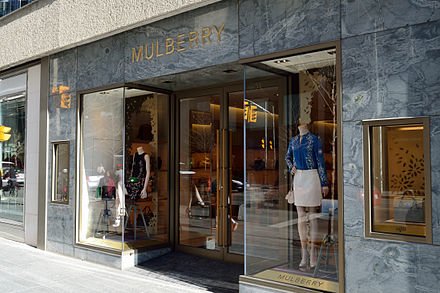British Heritage
Remember, Cherish, Learn.
beta
Mulberry - Leading Leather Fashion
Crafting Luxury and Heritage Through Leather Fashion.
Ever since its founding, Mulberry has played a crucial role in shaping the British heritage of high-quality leather goods and luxury fashion. The brand's substantial influence, rich history, and relentless commitment to quality have solidified its position as a cornerstone of Britain's fashion landscape.
Mulberry came into existence in 1971, a creation of Roger Saul and his mother Joan. The duo initiated their operations in Chilcompton, Somerset, England, opening a factory in 1973. This choice of location was no coincidence. Somerset was already a flourishing hub for leather fabrication, known particularly for the production of Clarks shoes.
The inception of Mulberry marked the establishment of a quintessentially British lifestyle brand. Mulberry quickly became a household name, admired for its leather poacher bags, which included the binocular bag and the dispatch bag. The brand's diverse range included both male and female fashions, leather accessories, and footwear. Mulberry Group plc eventually secured a listing on the London Stock Exchange under the ticker 'MUL,' offering shareholders owning more than 250 shares a 20% discount at Mulberry's shops.
In 2000, Mulberry was in a difficult position financially. Saul recruited Scott Henshall as Creative Director to help turn the company around. Henshall breathed new life into Mulberry's offerings, creating jewel items, rejuvenating their fashion and accessory collections, and leading a rebranding initiative. To enhance the brand's prestige, he brought actress Anna Friel on board as the face of Mulberry. In addition, Henshall strategically placed the brand on major celebrities like Victoria Beckham, Kate Winslet, Cameron Diaz, and Zara Tindall, garnering more exposure and acclaim.
However, Henshall departed in 2001 to concentrate on his own mainline collection. His tenure, while short, had a significant influence on Mulberry's trajectory, setting the stage for its resurgence in the coming years.
In 2006, Mulberry introduced an apprenticeship programme aimed at nurturing local talent and preserving the traditional skills crucial to the production of its high-quality leather goods. This initiative provided training and employment opportunities for the local community, with apprentices graduating from the programme being offered a job at the factories in Somerset.
The company posted strong financials in 2012, with a reported revenue of £168.5 million, an operating income of £35.4 million, and a net income of £36.0 million.
Emma Hill joined Mulberry as Creative Director in 2007 and was responsible for the creation of many popular items, including the coveted Alexa Chung handbag. However, she left the brand in 2013 due to creative differences. Her departure led to a drop in the company's share prices.
Over the years, Mulberry has continued to expand its retail footprint across the globe. By 2015, the company operated 70 directly owned stores. That year, the company's revenues were £148.7 million, reflecting a small growth in retail sales offset by a decline in wholesale sales.
In 2017, the brand further extended its international presence by launching its Mulberry Asia business with Challice, a joint venture partner. Later that year, the brand formed a joint venture named Mulberry Japan with Onward Global Fashion, establishing its headquarters in Tokyo.
In 2020, Frasers Group acquired a 12.5% stake in Mulberry, a deal reported to be worth around £19 million. Today, Mulberry has stores all over the world, including Europe, the US, Australia, and Asia, with registered offices in Somerset, London, and New York City.
Mulberry continues to craft designer leather goods at its original Somerset factory, known as The Rookery. In 2013, it launched a second factory in Somerset, which commenced production that summer. Officially named 'The Willows' in March 2014, the factory stands testament to the brand's commitment to British craftsmanship.
With over fifty years of experience in the luxury fashion industry, Mulberry's legacy is embedded in its adherence to quality, innovative design, and respect for craftsmanship. The brand stands as an embodiment of British heritage, shaping the landscape of leather fashion through the decades, while constantly evolving to meet the dynamic needs of the modern consumer.
Founding and Early Years
Mulberry came into existence in 1971, a creation of Roger Saul and his mother Joan. The duo initiated their operations in Chilcompton, Somerset, England, opening a factory in 1973. This choice of location was no coincidence. Somerset was already a flourishing hub for leather fabrication, known particularly for the production of Clarks shoes.
The inception of Mulberry marked the establishment of a quintessentially British lifestyle brand. Mulberry quickly became a household name, admired for its leather poacher bags, which included the binocular bag and the dispatch bag. The brand's diverse range included both male and female fashions, leather accessories, and footwear. Mulberry Group plc eventually secured a listing on the London Stock Exchange under the ticker 'MUL,' offering shareholders owning more than 250 shares a 20% discount at Mulberry's shops.
Turning Points and Transformation
In 2000, Mulberry was in a difficult position financially. Saul recruited Scott Henshall as Creative Director to help turn the company around. Henshall breathed new life into Mulberry's offerings, creating jewel items, rejuvenating their fashion and accessory collections, and leading a rebranding initiative. To enhance the brand's prestige, he brought actress Anna Friel on board as the face of Mulberry. In addition, Henshall strategically placed the brand on major celebrities like Victoria Beckham, Kate Winslet, Cameron Diaz, and Zara Tindall, garnering more exposure and acclaim.
However, Henshall departed in 2001 to concentrate on his own mainline collection. His tenure, while short, had a significant influence on Mulberry's trajectory, setting the stage for its resurgence in the coming years.
Commitment to Community and Craftsmanship
In 2006, Mulberry introduced an apprenticeship programme aimed at nurturing local talent and preserving the traditional skills crucial to the production of its high-quality leather goods. This initiative provided training and employment opportunities for the local community, with apprentices graduating from the programme being offered a job at the factories in Somerset.
The company posted strong financials in 2012, with a reported revenue of £168.5 million, an operating income of £35.4 million, and a net income of £36.0 million.
Challenges, Changes and Expansion
Emma Hill joined Mulberry as Creative Director in 2007 and was responsible for the creation of many popular items, including the coveted Alexa Chung handbag. However, she left the brand in 2013 due to creative differences. Her departure led to a drop in the company's share prices.
Over the years, Mulberry has continued to expand its retail footprint across the globe. By 2015, the company operated 70 directly owned stores. That year, the company's revenues were £148.7 million, reflecting a small growth in retail sales offset by a decline in wholesale sales.
In 2017, the brand further extended its international presence by launching its Mulberry Asia business with Challice, a joint venture partner. Later that year, the brand formed a joint venture named Mulberry Japan with Onward Global Fashion, establishing its headquarters in Tokyo.
In 2020, Frasers Group acquired a 12.5% stake in Mulberry, a deal reported to be worth around £19 million. Today, Mulberry has stores all over the world, including Europe, the US, Australia, and Asia, with registered offices in Somerset, London, and New York City.
An Ongoing Legacy
Mulberry continues to craft designer leather goods at its original Somerset factory, known as The Rookery. In 2013, it launched a second factory in Somerset, which commenced production that summer. Officially named 'The Willows' in March 2014, the factory stands testament to the brand's commitment to British craftsmanship.
With over fifty years of experience in the luxury fashion industry, Mulberry's legacy is embedded in its adherence to quality, innovative design, and respect for craftsmanship. The brand stands as an embodiment of British heritage, shaping the landscape of leather fashion through the decades, while constantly evolving to meet the dynamic needs of the modern consumer.
- Mulberry (company)en.wikipedia.org








